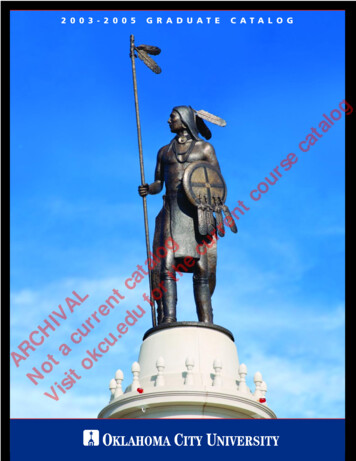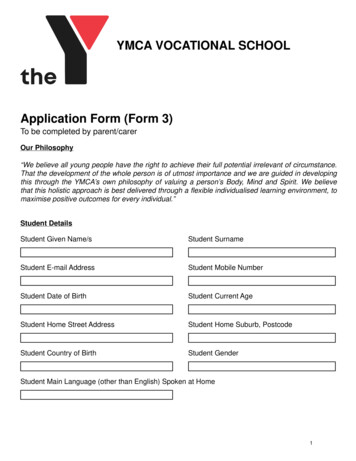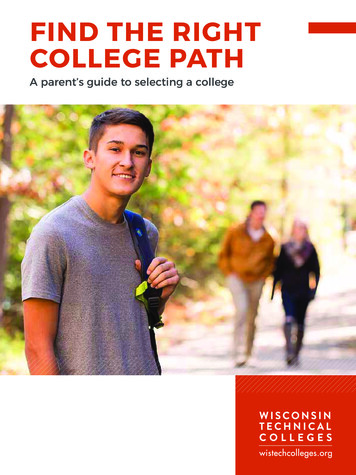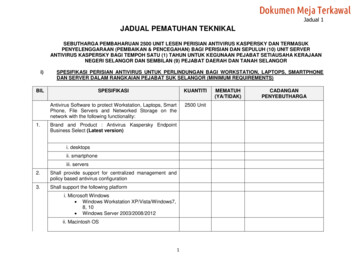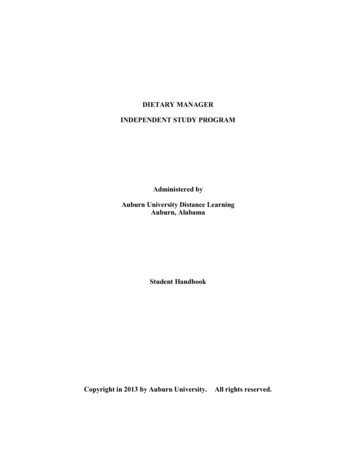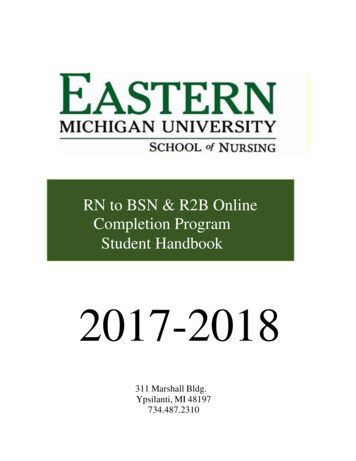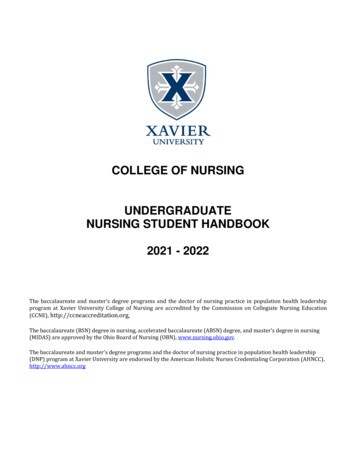
Transcription
KRAMER SCHOOL OF NURSINGStudenthandbookAugust 1, 2022– July 31, 2023THIS HANDBOOK SUPERSEDES AND REPLACES ANY AND ALL PREVIOUS HANDBOOKS.INFORMATION INCLUDED IS SUBJECT TO CHANGE WITHOUT NOTICE.These policies and procedures, supplemental in nature to policies and procedures in the Oklahoma CityUniversity (OCU) Student Handbook, the OCU Undergraduate Catalog, and the OCU Graduate Catalog areintended to clarify material contained therein or to address concerns and subjects not covered by thosedocuments. Where Kramer School of Nursing (KSN) policies are silent as to policies enumerated in the OCUStudent Handbook and catalogs, those documents shall govern.A comprehensive review and revision was conducted June 2022; Approved June 30, 2022
Table of Contents1. Policies & Procedures for All KSN StudentsA. General Information Standard of Responsibility Mission Statement of Oklahoma City University Mission Statement of Kramer School of Nursing The Kramer Way Nondiscrimination Statement KSN Student Code of Ethics Accreditation and Approval Curriculum Student Learning Outcomes Kramer School of Nursing ProgramsB. Admission, Progression, Graduation Technical Fitness Standards Transfer of Credit Student Petition Form Identification Verification Verification of English Language Requirement Grading Scale Pinning and Recognition Ceremony Withdrawal and Readmission PolicyC. Student Success Faculty Mentoring and Counseling Enrollment in Courses and Minimum Grade Requirements Syllabus Changes Testing and Review Policy Academic Honesty Academic Integrity Academic Integrity Reporting Form Written Work Format Learning Resources Student Absenteeism and Tardiness Student Leave of Absence Late Papers Early Warning Report KSN Probation Student Enrichment/Remediation Plan and Early Warning Communication of Concerns and Formal Complaints Grievance Procedure for Grade Appeal Student Dress Code in Classes and at Special Events Clinical/Simulation/Practicum Information PreceptorshipsD. Emergenciesa. Cancellation of ClassesPage 2 of 42424252626262728293030313333
b. Pandemic, Quarantine, or Prolonged Wide Area Emergencyc. COVID 19 Pandemic Guidelinesd. Crisis Management Plan for the Kramer School of Nursing Buildingo Fireo Violent Crimeo Non-Violent Crimeo Bomb Threatso Medical Emergencieso Tornadoo Active Shootero Electrical Emergencieso Plumbing EmergenciesE. Other Official Policies Tobacco Use on Campus Alcohol, Illegal Drugs, Firearms Children at KSN or Clinicals/Practicums Electronic and Social Media Policy Laptop Computer Requirement and Minimum Specifications Netiquette Equipment Loan Policy Transportation Fees Sigma Theta Tau International Student Representatives for Faculty Organization MeetingsF. Other Useful Information KSN Faculty & Staff Directory Campus Telephones Student Services2. Policies & Procedures: Traditional and RN-BSN Undergraduate Education Program Learning Outcomes of the BSN Degree Traditional BSN Students Nursing Course Prerequisites for Traditional UndergraduatePrograms NCLEX-RN Preparation Plan Standardized Testing Standardized Testing Schedule Group Testing Procedures Eligibility Requirements by the State of Oklahoma forRegistered Nurse Licensure Information for Applicants for Licensure or AUA Certificationwith History of Arrests, Convictions, or Prior DisciplinaryAction NCLEX or AUA Certification Applicants with History ofArrest/Deferred Sentence/Conviction Policy Licensure or Certification for those with a Criminal History RN-BSN StudentsPage 3 of 44444545495050505050515151525354
RN-BSN Pathway Options Nursing Course Sequence in the RN-BSN Curriculum Progression Requirements for RN-BSN Students3. Policies & Procedures: Graduate EducationA. Master’s Students Program Learning Outcomes in MSN Degree Tracks Nursing Courses in the MSN Curriculum RN-to-MSN Option Graduation RequirementsB. Doctoral Students Program Learning Outcomes of the Doctoral Programs Program Learning Outcomes of the Doctor of Philosophy (PhD) Degree Program Learning outcomes of the Doctor of Nursing Practice (DNP)Degree Prior Learning Credit for Graduate-Level Courses Progression Requirements for Doctoral Students Withdrawal and Leave of Absence Residency Requirements Program Completion Policies and Procedures Specific to DNP Studentso MSN-DNPo BSN-DNP Program/ FNP, AGACNP, or PMHNP Tracko Post-DNP Certificate Clinical Research Methodso DNP Project Policies and Procedures Specific to PhD Studentso BSN-to-PhDo PhD Candidacyo PhD DissertationAppendix: FormsA. All KSN Programs Student Waiver and Release Agreement Request for Leave of Absence Form KSN Student Handbook Signature Sheet Communication Tracking Form for Formal Complaints Communication Tracking Form for Grade AppealB. Doctoral Projects/Dissertations Project/Dissertation Committee Form Project/Dissertation Completion Approval Form Acceptance Sheet for Project/DissertationPage 4 of 6666676970707273747576767778
Chapter One:Policies & Procedures forAll KSN StudentsPage 5 of 78
1-A. General InformationStandard of ResponsibilityEvery student is expected to observe the highest standards of conduct, both on and off the campus. TheUniversity cannot accept responsibility for the education of any student who is not in sympathy with thepurposes and the regulations of the University.The University reserves the right to exclude any student whose conduct or academic standing it regardsas undesirable, and without assigning any further reason therefore; in such cases the fees due or whichmay have been paid in advance to the University will not be remitted or refunded in whole or in part.Neither the University nor any of its officers shall be under any liability whatsoever for such exclusion.Any student under disciplinary suspension shall be persona non grata on campus except for officialbusiness.The entire judicial structure of the University is set forth in the Oklahoma City University StudentHandbook, available from the Office of the Dean of Students. Students are responsible for knowing allinformation contained in the Oklahoma City University undergraduate and graduate catalogs (asappropriate to their degree program) and all class schedules. Copies of these documents can be obtainedin the Office of the Registrar and/or online.Each student in the Kramer School of Nursing is responsible, not only for information contained in thisnursing student handbook, but for reading, understanding, and adhering to policies outlined in theOklahoma City University Student Handbook and the Oklahoma City University undergraduate andgraduate catalogs (as appropriate to their current degree program) in their entirety. The policies withinthese documents are subject to change, and it is the student’s responsibility to adhere to any publishedchanges that take place throughout the academic year.Tuition and mandatory fees have been set regardless of the method of instruction and will not be modifiedor refunded in the event instruction occurs remotely or via a hybrid model for any part of the AcademicYear. In the event Oklahoma City University cancels in-progress courses because of a campus closure orinstitution-wide transition to remote instruction, and such cancellation results in a change in a student’senrollment status, Oklahoma City University may, at its discretion, refund a portion of the student’s tuitionand/or course-specific fees (such as lab fees). Temporary or permanent changes to the method ofinstruction, regardless of when they are implemented, are not grounds for refunds under the University’stuition and fee refund policy.We believe the value of an Oklahoma City University education and degree, whether in-person or remote,continues to greatly exceed tuition. Moreover, our main educational costs are continuing, as the servicesthey provide are continuing; our infrastructure costs are continuing; and we are incurring additional costsPage 6 of 78
for online education and actions we are taking to respond to the pandemic. As such, Oklahoma CityUniversity does not refund tuition because of changes to the method of instruction.We continue to work with students and families who are in financial distress due to the coronaviruspandemic, and we encourage you to reach out if you need help. Please contact the Financial Aid Officefor more information.Every effort has been made to ensure the accuracy of the information presented in the KSN StudentHandbook. However, all courses, course descriptions, materials, schedules, sequences of courses inprograms, instructor designations, curricular degree requirements, methods of instruction, locations ofinstruction, and fees described herein are subject to change or elimination without notice. Thisinformation is provided solely for the convenience of the reader and does not constitute or create acontract between prospective or current students and Oklahoma City University. Students shouldconsult the appropriate department, school, college, or graduate division for current information, as wellas for any special or temporary rules or requirements imposed by the department, school, college, orgraduate division.Mission Statement of Oklahoma City UniversityOklahoma City University prepares all learners to Create, Lead, and Serve. We provide a diverse,inclusive culture committed to producing graduates who think critically and innovatively, communicateeffectively, and use their knowledge and talents to make a local and global impact.Oklahoma City University is committed to an education that:*Provides students with the skills and confidence to adapt to and excel in a complex and dynamic world*Invests continually in its students, staff, faculty, alumni, and programming to enrich academic and cocurricular offerings*Fosters partnerships within and beyond the university to enrich lifelong learning*Develops informed global citizens ready to engage with their communities and contribute to theworld*Develops graduates who are ethical, highly employable professionals*Honors our United Methodist history and tradition of scholarship and serviceMission Statement of Kramer School of NursingThe mission of Kramer School of Nursing is to provide individualized education and unique serviceopportunities that prepare professional nurses who practice with integrity, knowledge, and compassionwhile positively impacting the health care needs of diverse communities.The Kramer WayKSN is committed to the creation of an atmosphere of caring, kindness, and respect: the core values ofthe Kramer Way. These attributes are to be present and visible in all interactions at Kramer School ofPage 7 of 78
Nursing, whether the interactions are between faculty and staff, faculty and student, and all otherindividuals within KSN. It is our belief that learning best occurs in such an environment. We expect it ofourselves; we expect it of our students.Nondiscrimination StatementOklahoma City University adheres to all federal and state civil rights laws prohibiting discrimination inprivate institutions of higher education. The University will not discriminate against any employee,applicant for employment, student or applicant for admission on the basis of race, religion, color, sex,pregnancy, political affiliation, religion, creed, ethnicity, national origin (including ancestry), citizenshipstatus, physical or mental disability, age, marital status, sexual orientation, gender, gender identity,gender expression, veteran or military status (including special disabled veteran, Vietnam-era veteran, orrecently separated veteran), predisposing genetic characteristics, domestic violence victim status or anyother protected category under applicable local, state or federal law, including protections for thoseopposing discrimination or participating in any resolution process on campus or within the EqualEmployment Opportunity Commission or other human rights agencies.Reports of discrimination, harassment, and/or retaliation may be made using any of the followingoptions. There is no time limitation on the filing of allegations. However, if the responding party is nolonger subject to Oklahoma City University’s jurisdiction, the ability to investigate, respond and provideremedies may be more limited:Report directly to the Title IX Coordinator or Deputy Title IX CoordinatorMs. Joey C. CroslinTitle IX CoordinatorAdministration BuildingSuite 205 (405) 208-5075jcroslin@okcu.eduKSN Student Code of EthicsAs nursing students at Oklahoma City University’s Kramer School of Nursing, we pledge to embraceour first responsibility to those entrusted to our care and with those with whom we work in the course ofour studies. We will:o Respect and defend the dignity and freedom of every person: self, colleagues, faculty,patients and their families, and all those with whom we work;o Respect and advocate for the rights of all patients, families, and colleagues;o Maintain confidentiality, truthfulness, and integrity in all privileged information and inthe use of all communication methods, including emerging social networks;o Provide compassionate care to all people entrusted to us regardless of their ages, color,race, culture, gender, religion, sexual orientation, illness, reasons for illness, or thelocation of their homes;Page 8 of 78
o Engage in evidence-based practice to assure the highest quality of nursing care;o Refuse to participate in any action, behavior, or procedure that is unethical; that violatesthe dignity, freedom, conscience, or privacy of self or others; or that places self or othersat risk;o Engage in self-care behaviors and activities through a balance of work and leisure time;o Facilitate the development of a caring community for other students and for all who areinstrumental in our education by showing respect, mentoring, speaking for those whoneed an advocate, and aiding all in times of need; ando Support policies, procedures, and guidelines of Oklahoma City University and KramerSchool of Nursing, and use established structures to promote understanding and dialogueto facilitate responsible change.Accreditation and ApprovalThe Oklahoma City University Kramer School of Nursing is approved by the Oklahoma Board ofNursing, located at 2501 N Lincoln Blvd., Ste 207, Oklahoma City, Oklahoma 73105, and available byphone (405-962-1800) and on the web ( https://nursing.ok.gov/). Traditional Undergraduate graduatesof this state-approved program are eligible to apply to write the National Council of LicensureExamination (NCLEX) for Registered Nurse Licensure. The Kramer School of Nursing is alsoaccredited by the Accreditation Commission for Education in Nursing, Inc. (ACEN) for its BSNprograms, the Master of Science in Nursing (MSN) program, and the Doctor of Nursing Practice (DNP)program. To contact the ACEN, write to 3343 Peachtree Road NE, Suite 500, Atlanta, Georgia 30326,call (404) 975-5000, or visit them on the web at www.acen.org. Oklahoma City University is accreditedby the Higher Learning Commission of the North Central Association of Colleges and Schools.CurriculumPhilosophyWe, the Faculty of Kramer School of Nursing, believe:As faculty of a faith-based institution of higher education, the education of individuals for the professionof nursing is a calling with spiritual implications that leads to a deeper commitment, higher goals, apursuit of excellence, and service to others. We believe that our obligation is to produce professionalswho are skilled clinically, who can think critically, and who are ethically and legally accountable fortheir actions. We believe that both faculty and students must be culturally competent and sensitive tothe range of beliefs they will encounter among those with whom they have professional interaction. Weaspire to treat each member of our student body as an individual with distinct needs for fostering his orher success and welfare.Page 9 of 78
Baccalaureate graduates develop a foundation for the acquisition of the knowledge, skills, criticalthinking, and experience necessary for success and leadership in nursing. We strive to provide wellrounded clinical experiences caring for clients throughout the life span. Graduates are prepared tofunction within the global community and to employ the fruits of their education to improve theircommunities.Nursing at the master’s level requires the attainment of knowledge, beliefs, and skills needed for morecomplex and higher level nursing roles through theoretical, evidence-based, and applied studies.Master’s education prepares nurses for these roles by building on the foundations of baccalaureatenursing education.Doctoral education prepares nurse scholars for leadership roles in education, research, and service bydeveloping and advancing empirical knowledge. Nursing knowledge is derived from the scholarship ofdiscovery, application, and integration into practice. Doctoral education stimulates intellectual inquiryand creativity to promote evidence-based practice in the discipline of nursing.The Faculty of the Kramer School of Nursing offers the following descriptions of core concepts of thenursing curriculum:Nurse/NursingProfessional nursing incorporates direct care to clients, education, leadership, andscholarship. The professional nurse is an integral part of the health care team whouses critical thinking, the nursing process, and competent clinical skills to assistclients to achieve optimal levels of health. Nursing practice integrates knowledgeof liberal arts, sciences, and general education as a basis for caring for clients indiverse settings. Nursing practice is a collaborative activity involving individualclients, family members, community members, and other members of the healthcare system. The nurse collaborates with and educates clients according to theability of the client to participate actively in health care decision-making andactivities. The uniqueness of nursing is an attitude of caring demonstratedthrough ethically and legally accountable frameworks of nursing practice.Professional nursing is a calling with spiritual implications that leads to a deepercommitment, higher goals, a pursuit of excellence, and service to others.CaringCaring requires connections between the nurse and client based on empathy,acceptance, and respect. The caring nurse collaborates with the client to promotehealth, restore wellness, and prevent illness. Caring incorporates dignity,humanity, wholeness, and spiritual harmony.ClientClient is defined as those with whom the nurse interacts for the purpose ofoptimizing health care. The client may be an individual, a family, a group, or thePage 10 of 78
community as a whole. The concept of community may range from localcommunities to the broad global community. Nurses care for clients across thelife span of human development.EnvironmentThe environment consists of multiple factors that influence the interactions ofnurse, client, and health outcomes. The environment incorporates the client’sinternal micro system as well as the external macro system. The micro systemincludes the interdependent physical, mental, social, and spiritual subsystems.The macro system is the structures, settings and organizations within which healthcare, education, or scholarship is provided. Within the health care system, theprofessional nurse coordinates, collaborates, and delegates nursing care of clients.HealthHealth is a framework for identification of the level of physical, mental, social,and spiritual well-being of clients. Wellness is a state of optimal physical, mental,social, and spiritual well-being. A well individual assumes responsibility tofunction at optimal levels in physical, mental, social, and spiritual realms. Anindividual’s actual or perceived level of wellness may be identified using thewellness-illness continuum.Student Learning OutcomesStudent learning goals are expressed as program learning outcomes of the degree programs of theKramer School of Nursing, are derived from the Mission Statement, and are reflective of the KramerSchool of Nursing Philosophy. The program learning outcomes are based on the following professionalnursing guidelines: AACN Essentials (2008/2011) QSENKramer School of Nursing used these standards in designing the programs and curriculum and continuesto use them in ongoing quality improvement. For role specific professional competencies, refer to theappropriate subsection of this handbook for the program goals of each level of degree program.Kramer School of Nursing ProgramsTraditional Undergraduate Education provides an entry into the profession as new nurses. Studentsreceive a BSN degree and eligibility to apply for the National Council Licensure Examination (NCLEX)to become a Registered Nurse. The program prepares students to provide and evaluate nursing care toaddress the existing and emerging health care demands of the total patient community.Professional Advancement Programs are for Registered Nurses (RN), Advanced Practice RegisteredNurse (APRN). The RN-BSN track is an accelerated program for RNs wanting to complete the BSNPage 11 of 78
degree. The Master of Science in Nursing (MSN) offers a track in Nursing Education that preparesstudents for careers in academia or staff education, a track in Nursing Leadership that prepares graduatesfor executive and administrative careers, and a track in Community-Based Public Health (CBPH) thatprepares graduates to assume leadership roles in CBPH settings. The Doctor of Nursing Practice (DNP)program has multiple options:1.2.3.4.A 66-credit-hour BSN-DNP (Family Nurse Practitioner) track.A 67-credit-hour BSN-DNP (Adult-Gerontology Acute Care Nurse Practitioner) track.A 68- credit hour BSN-DNP (Psychiatric Mental Health Nurse Practitioner) track.A 30-credit-hour MSN-DNP clinical track for nurse practitioners, nurse anesthetists, andother advanced practice nurses to obtain their professional clinical doctorate.5. A 30-credit-hour MSN-DNP community based public health track for registered nurses whohave experience and desire to work in community health and public health settings.6. A 31-32-credit-hour MSN-DNP executive leadership track for nurse administrators withadvanced certification to obtain their professional leadership doctorate. Students may choosean educational leadership focus or an organizational leadership focus.The PhD focuses on nursing education and research, preparing nurses for careers in research and/orprofessorates. Finally, KSN offers a variety of post-doctoral and post-masters certificate options.1-B. Admission, Progression, GraduationTechnical Fitness StandardsNursing education requires that the accumulation of scientific knowledge be accompanied by thesimultaneous acquisition of skills and professional attitudes and behaviors. The nursing degrees awardedby Oklahoma City University Kramer School of Nursing at the completion of the educational processcertifies that the individual has acquired a base of knowledge and skills requisite for the practice ofnursing at the respective undergraduate or graduate level.To this end, all courses in the curriculum must be completed successfully. In order to acquire theknowledge and skills to function in a variety of clinical situations and to render a wide spectrum ofpatient care, candidates for the undergraduate and graduate degrees in nursing must have abilities andskills in five areas: Observation Communication Motor Conceptual-Integrative Behavioral-SocialPage 12 of 78
Technological compensation can be made for some disabilities in certain of these areas, but a candidateshould be able to perform in a reasonably independent manner and exercise independent judgment.Observation. The candidate must be able to observe demonstrations and participate in didactic coursesand simulated learning opportunities. A candidate must be able to observe a patient accurately at adistance and close at hand. Observation requires the use of common sense, as well as the functional useof the senses of vision, audition, olfaction, and palpation.Communication. Candidates must communicate effectively using English in clinical and classroomsettings. A candidate must be able to elicit information from patients, describe changes in mood, activityand posture, and perceive nonverbal communications. A candidate must be able to communicateeffectively and sensitively with patients. Communication includes not only speech, but reading andwriting. The candidate must be able to communicate effectively and efficiently with all members of thehealth care team in both immediate and recorded modes.Motor. Candidates should have sufficient motor function to elicit information from patients bypalpation, auscultation, percussion and other assessment techniques. A candidate should be able toperform nursing skills requiring the use of gross and fine motor skills (e.g. IV insertion, venous blooddraw, urinary catheter insertion). A candidate should be able to execute motor movements reasonablyrequired to provide nursing care and emergency response to patients. Examples of emergency responsesreasonably required of nurses are cardiopulmonary resuscitation, medication administration, andapplication of pressure to stop bleeding. Candidates must perform actions which require the use of bothgross and fine muscular movements, equilibrium, and functional use of the senses of touch and vision.Candidates should also be able to assist and/or participate in various lifting activities.Conceptual-Integrative. These abilities include measurement, calculation, reasoning, analysis, synthesis,and retention of complex information. Critical thinking and clinical judgement requires all of theseintellectual abilities in order to provide safe, optimal nursing care. In addition, the candidate should beable to comprehend three-dimensional relationships and to understand the spatial relationships ofstructures.Behavioral-Social. Candidates must possess the emotional health required for the full use of theirintellectual abilities, the exercise of good judgment, the prompt completion of all responsibilitiesattendant to the care of patients, and the development of mature, sensitive and effective relationshipswith patients. Candidates must be able to tolerate physically taxing workloads and to functioneffectively under stress in the classroom and clinical area. They must be able to adapt to changingenvironments, display flexibility and learn to function in the face of uncertainties inherent in the clinicalenvironment. Compassion, integrity, concern for others, interpersonal skills, interest and motivation areall personal qualities that are assessed during the admissions and educational process.Page 13 of 78
Reasonable accommodations will be considered on a case-by-case basis for individuals who meeteligibility under applicable statutes. Any person expecting to need accommodations should request themprior to beginning the program, as some accommodations may not be considered reasonable and mayimpact an applicant’s ability to complete all components of the nursing program.Transfer of CreditConsistent with the OCU Undergraduate and Graduate Catalogs, equivalent courses may be transferredfrom accredited colleges and universities to OCU. All transfer work will be reviewed on a case-by-casebasis. Transfer analysis must be completed before completing a Degree Completion Plan for applicableprograms. Equivalency of courses for transfer will be determined at the initial transcript evaluationduring the application process. Students may petition for approval of non-nursing course work that is inquestion as to equivalency. Once admitted to Kramer School of Nursing, students planning to takecourses at other universities must have prior approval of the Dean or designee on the “Student Petition”form. General Education courses may need to be approved by the General Education Committee or itsdesignees.No more than six credit hours of graduate-level work may be transferred for the MSN and MSN-DNPdegrees. No more than nine credit hours of graduate-level work may be transferred for the BSN-DNPdegree. No more than 33 credit hours of master’s level coursework may be transferred for applicationtoward completion of PhD requirements. No more than 15 credit hours of previous study at the postmaster’s or doctoral level may be accepted for the PhD degree.Students may request approval of coursework that is not addressed in the University’s online courseequivalency list, or other established mechanisms may determine equivalency by using the “StudentPetition” form available from the appropriate program specialist. Once a student is admitted to theuniversity, coursework taken at other colleges must have prior approval using the “Student Petition”form.Undergraduate students wishing to transfer in general education courses may need to have those coursesapproved by the assigned representatives of the General Education Committee as applicable. Anygraduate transfer course must have at least a grade of B (3.0) to be accepted. Graduate students desiringtransfer credit must initiate that process during the initial phases of their degree planning. If the processis delayed, the transfer may not be accepted. Kramer School of Nursing encourages all coursework betaken at Oklahoma City University, because supporting courses retain the holistic focus of thecurriculum.Page 14 of 78
Student Petition FormStudents requesting special permission related to taking overloads, meeting residency requirements,taking courses elsewhere, and so forth are to submit the “Student Petition” form to the appropriateProgram Specialist for routing. The form is available from any KSN Program Specialist.Identification VerificationThe Kramer School of Nursing reserves the right to prohibit
The Oklahoma City University Kramer School of Nursing is approved by the Oklahoma Board of Nursing, located at 2501 N Lincoln Blvd., Ste 207, Oklahoma City, Oklahoma 73105, and available by phone (405-962-1800) and on the web ( https://nursing.ok.gov/).


